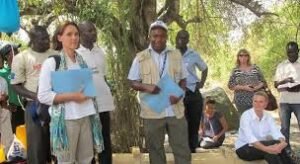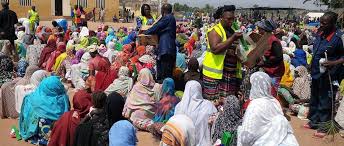On a good day humanitarian work or aid is a dream health service. But, due to incessant killings, abductions for ransom and maiming of aid workers by terrorists operating especially in parts of Nigeria, humanitarian workers have become endangered. Korede Abdullah reports
A grim picture
On the solemn occasion of World Humanitarian Day, 2024, which took place on August 19, the United Nations’ Office for the Coordination of Humanitarian Affairs (OCHA) unveiled a grim tapestry of violence and bloodshed, woven from the threads of 280 lives lost in 33 countries.
The year 2023 stood as a haunting milestone, etched in the annals of history as the deadliest for humanitarian workers, a stark testament to the perils that stalk those who dare to tread the treacherous paths of compassion.
As the somber data unfolded, a chilling narrative emerged, painting a grim picture of a world where the guardians of hope and aid are increasingly beset on all sides by the spectre of death.

The toll of 280 fallen aid workers served as a poignant reminder of the high cost of sacrifice, a heart-wrenching testament to the boundless risks borne by those who toil in the shadows of conflict and despair, their selfless endeavours a beacon of light in a world torn asunder by darkness and strife.
The data represents a staggering 137% increase from 2022, when 118 aid workers were killed. The situation appears to be worsening, with OCHA warning that 2024 may be even deadlier. As of August 7, 172 aid workers had already lost their lives.
The majority of the 2023 deaths occurred during the first three months of hostilities in Gaza, between October and December. The OCHA also highlighted the “extreme levels of violence” in Sudan and South Sudan as significant contributors to the death tolls in both 2023 and 2024.
The acting head of OCHA, Joyce Msuya, called for urgent action to address this crisis. The increasing number of fatalities among humanitarian workers is a stark reminder of the risks they face while providing critical assistance to those in need.


The OCHA’s report serves as a stark reminder of the dangers faced by aid workers globally. It is essential that measures are taken to ensure their safety and security, allowing them to continue their vital work without fear of harm.
Killings of aid workers in Nigeria
In the midst of conflict and crisis, humanitarian workers are often the only lifeline for vulnerable populations. However, in northern Nigeria, these selfless individuals have become targets of terror.
Terrorist groups and bandits have increasingly attacked aid workers, including Red Cross members and health workers, leaving a trail of death and destruction in their wake.
The attacks have sent shockwaves through the humanitarian community, forcing organizations to reevaluate their operations and leaving countless civilians without access to critical aid.
The targeting of humanitarian workers has become a stark reminder of the brutality and senselessness of the conflict in northern Nigeria.
Nigerian government rallies for support
The Nigerian government during the World Humanitarian Day, used the occasion to sound the alarm on the escalating attacks on humanitarian workers in the country, sparking widespread concern over the safety of aid providers.
The Northeast region, a hotbed of insurgent activity, has emerged as a particularly treacherous terrain for humanitarians, who risk life and limb to deliver critical assistance to those in need.
The attacks have not only imperilled the lives of aid workers but also disrupted vital operations, hindering the delivery of essential services to vulnerable populations.
The perpetrators have employed a range of brutal tactics, including targeted killings, ambushes, and kidnappings, leaving aid workers in a state of constant fear and uncertainty.
As the situation continues to deteriorate, the Nigerian government’s call to attention serves as a stark reminder of the need for urgent action to protect humanitarian workers and ensure the unfettered delivery of aid to those who depend on it.
The Nigerian government calls on the international community to support Nigeria in addressing this crisis, so that the already precarious situation does not spiral further out of control.
A Pattern of Violence
In recent years, there has been a disturbing trend of attacks on humanitarian workers in northern Nigeria. In 2022, two aid workers were killed in a targeted attack on a humanitarian convoy in Borno State. In another incident, a health worker was abducted and later found dead in a rural area of Yobe State.
The International Committee of the Red Cross (ICRC) has also been targeted, with several of its workers killed or injured in attacks. In one incident, an ICRC vehicle was ambushed, resulting in the death of a staff member.
Consequences of the Attacks
The attacks on humanitarian workers have severe consequences for the civilian population. With aid workers being targeted, critical assistance is being denied to those who need it most. This includes food, shelter, medical care, and other essential services.
The attacks have created a climate of fear, making it increasingly difficult for humanitarian organizations to operate in the region. This has resulted in a reduction of aid delivery, exacerbating the already dire humanitarian situation.
The killing of aid workers in conflict areas can discourage humanitarian work. The risk of being killed or injured deters many potential aid workers from volunteering or continuing their work.
According to the newspaper’s findings, in the northeast of Nigeria which has been the epicentre of insurgency, repeated attacks on aid workers has eroded trust in the safety measures and security protocols, making aid workers question their organization’s ability to protect them.
AHR learned that the trauma and stress of working in high-risk environments has led to burnout and fatigue on the part of aid workers, causing them to leave the field.
Many of the aid workers have been demotivated as a result of the senseless killing of their colleagues which has led to feelings of hopelessness causing them to question the impact of their work.
A Call to Action
The targeting of humanitarian workers in northern Nigeria and other parts of the world has been described as a clear violation of international humanitarian law by various commentators.
They insisted it’s imperative that the Nigerian government and international community take immediate action to protect aid workers and ensure the safe delivery of humanitarian assistance.
This includes increasing security measures for humanitarian convoys and personnel, as well as holding perpetrators accountable for their actions.
The international community must also continue to support humanitarian efforts in the region, ensuring that critical aid reaches those who need it most.
Conclusion
As the World Humanitarian Day 2024 has been concluded, the killings of aid and humanitarian workers in northern Nigeria and other parts of the world are a stark reminder of the brutality of conflict.
It is essential that the appropriate authorities take action to protect these selfless individuals, ensuring that they can continue to provide critical assistance to those in need.
The world cannot afford to turn a blind eye to this crisis – the stakeholders must act now to prevent further loss of life and ensure that humanitarian aid reaches those who depend on it for survival.



